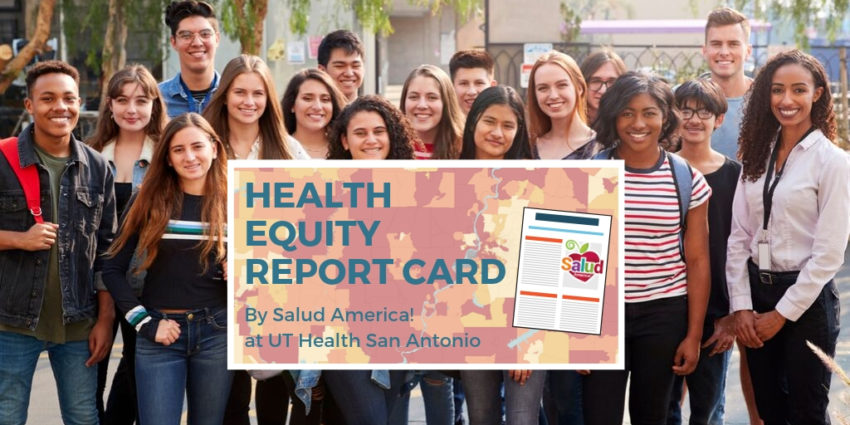
Share On Social!
Wonder what health equity looks like in your community?
Select your county name and get a customized Health Equity Report Card from Salud America! at UT Health San Antonio, which shows your area stacks up in housing, transit, poverty, health care, food, and other health equity issues compared to your state and nation.
The Health Equity Report Card auto-generates local data with interactive maps and comparative gauges, which can help you visualize and explore health inequities.
Get your Health Equity Report Card!
“People can easily email their local Health Equity Report Card to decision-makers, share it on social media, and use it to make the case for community change to boost health equity—where everyone has a fair, just opportunity to live the healthiest lives possible,” said Dr. Amelie G. Ramirez, director of the Salud America! Latino health equity program, funded by the Robert Wood Johnson Foundation and based at the Institute for Health Promotion Research in the Department of Population Health Sciences at UT Health San Antonio.
Salud America!‘s Health Equity Report Card uses databases from the University of Missouri’s Center for Applied Research and Engagement Systems.
Each report card includes local data, maps, and gauges on:
- Housing: Cost-burdened, substandard, affordability, mortgage lending.
- Schools: Graduation, reading proficiency, Head Start enrollment, etc.
- Transportation: Commute times, car-less households, crash mortality.
- Food: Food deserts, food access, food insecurity, fast food, grocery, SNAP.
- Environment: Population density, tree canopy, air toxin exposure, etc.
- Socioeconomic status: Income, poverty, no high-school diploma, violent crime.
- Health care: Uninsured, access to primary, prenatal, mental health, and dental care.
- Physical and mental health: Diabetes, heart disease, obesity, asthma, cancer, premature death, Alzheimer’s, depression, social-emotional support.
- Comparisons of Latinos to non-Latino Whites: Poverty, obesity, median household income, high-school diplomas, lack of health insurance, teen birth rates, asthma, infant mortality, cancer mortality, and motor vehicle crash deaths.
For example, the Health Equity Report Card for Bexar County, Texas, demonstrates monumental inequities between Latinos and non-Latino whites in the percentage of children in poverty, (27% to 10%), uninsured (20% to 9%), and median household income ($46,079 to $70,203).
In housing, it also shows a greater percentage of Bexar County residents are severely housing cost-burdened, face substandard housing conditions, and would have to work 49 hours a week to afford the average-priced two-bedroom home.
Fortunately, each Health Equity Report Card also contains links to evidence-based research and emerging ways local communities are addressing health inequities.
“Advocates can use these report cards to identify gaps in health equity, spur ideas for healthy change, push policymakers for action, and get data for research and proposals,” Ramirez said.
Get your Health Equity Report Card!
Explore More:
Healthy Families & SchoolsBy The Numbers
142
Percent
Expected rise in Latino cancer cases in coming years



